Table of Contents
Do Squirrels Eat Fruits?
Squirrels are usually not picky about their food and will eat any food readily available or available to them. They are, however, more inclined to vegetables and fruits. Squirrels are known to be impatient, especially with fruits, because they will eat most fruits like pawpaws and mangoes before they fully mature/ripen.
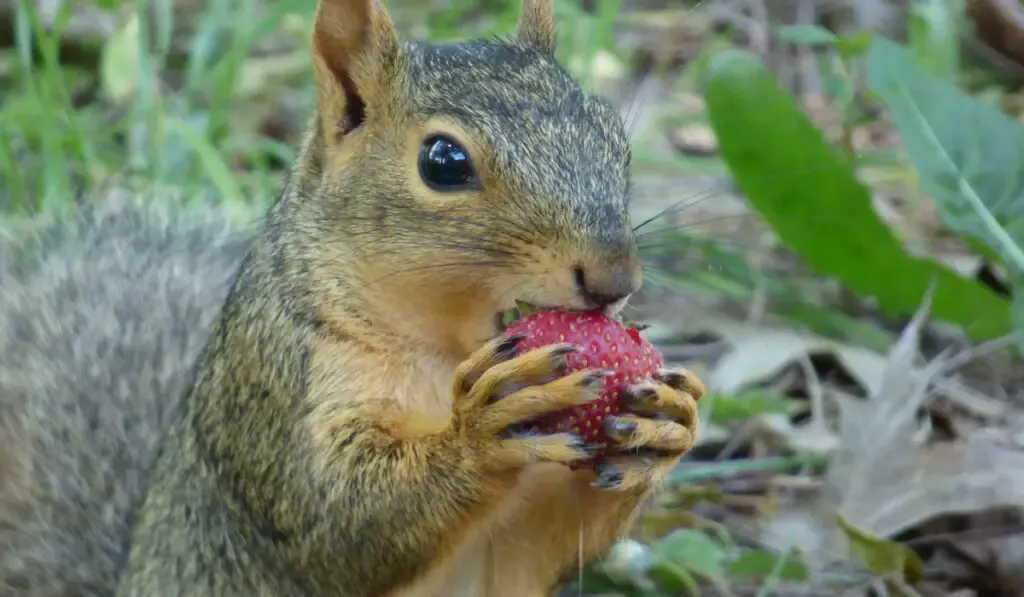
Remember that a squirrel’s diet should consist largely of nuts and seeds, with fruit serving as an occasional treat or snack.
Squirrels enticed by the delicious taste of fruit may put their health worries aside and consume too much of the delightful delicacy, which makes it our obligation to always give them the fruit in the respective amount to reduce the adverse health effects on the squirrel.
Squirrels are the most charming of all the rodents that dwell around homes because they are surprisingly fast and entertaining to watch. Making friends with them can, however, at times get hard because their first reflex when they see a human is to flee because they perceive us as threats.
If you are successful in bonding with them, it will prove to be a great pleasure and adventure. To solve this, using fruits as ‘bait’ to entice them into friendship is the most common and effective method.
Among the most common fruits that squirrels love to eat are apples, bananas, strawberries, pineapples, cantaloupe, blueberries, papaya, mango, grape, kiwi, passion fruit, peach, watermelon, raspberries, pears, lime, and oranges, among others.
You should note that pits and some seeds can be toxic for squirrels, and so it is therefore always necessary to take precaution not to endanger the little rodent’s life.
Let’s narrow these fruits down into more details about their significance in the squirrel’s body.
Fruits Squirrels Love to Eat
1. Apples
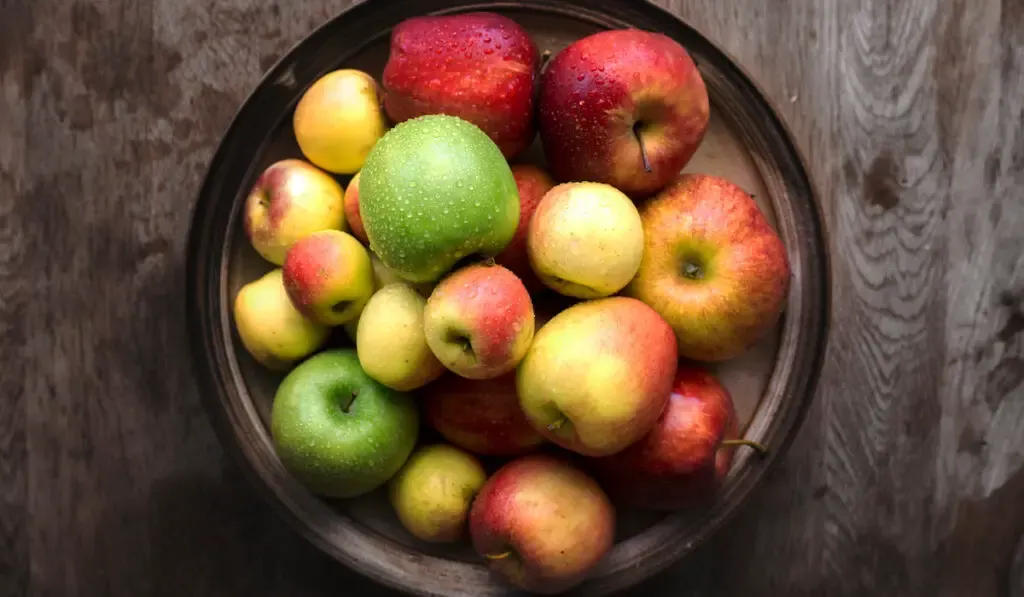
Squirrels love eating apples. They are attracted to these colorful fruits because they are delicious. However, you should avoid feeding apples or other sweet treats to squirrels on a regular basis, since the high sugar content might be harmful to their health.
They should be fed once in a while because of their high nutritional values which are subsequently needed to supplement the squirrel’s nutritional needs.
Squirrels can eat both the apple’s coat and flesh, but not the seeds. The seeds contain small amounts of cyanide, a naturally occurring compound that is toxic to squirrels and can even cause death.
Health benefits
Apples are among the most nutrient-dense fruits available and are also among the healthiest treats for squirrels.
- Vitamin A – This nutrient is essential for the maintenance of respiratory health, reproductive health, and strengthened eyesight.
- Vitamins B series and C – these essential vitamins promote healthy growth and speed up the wound healing process. Vitamin C also strengthens the body’s immunity, serving as an antioxidant in the body.
- Bone health – apples are rich in minerals such as magnesium, calcium, and phosphorus, all of which work together to keep the bones healthy and strong. However, calcium is more essential and in demand because it is also responsible for tooth growth, a lifelong process for squirrels.
- Proteins – apples have proteins in moderate quantities, a nutrient needed by squirrels for hair and muscle development.
Precautions when feeding apples to squirrels
The natural sugar in apples might not be bad for them because they are natural, but overfeeding the squirrels apples might lead to the accumulation of these sugars to toxic levels in the body.
These critters are already energetic as they are and do not need extra energy. Due to the high sugar levels, they might get too excited, a factor that could easily escalate to an increase in blood pressure levels.
Since apples have much more fiber content than is needed daily by a squirrel, excess consumption could lead to digestive problems. It is therefore recommended to give them only a few slices at most twice per week, otherwise, it could be detrimental to their health.
2. Bananas
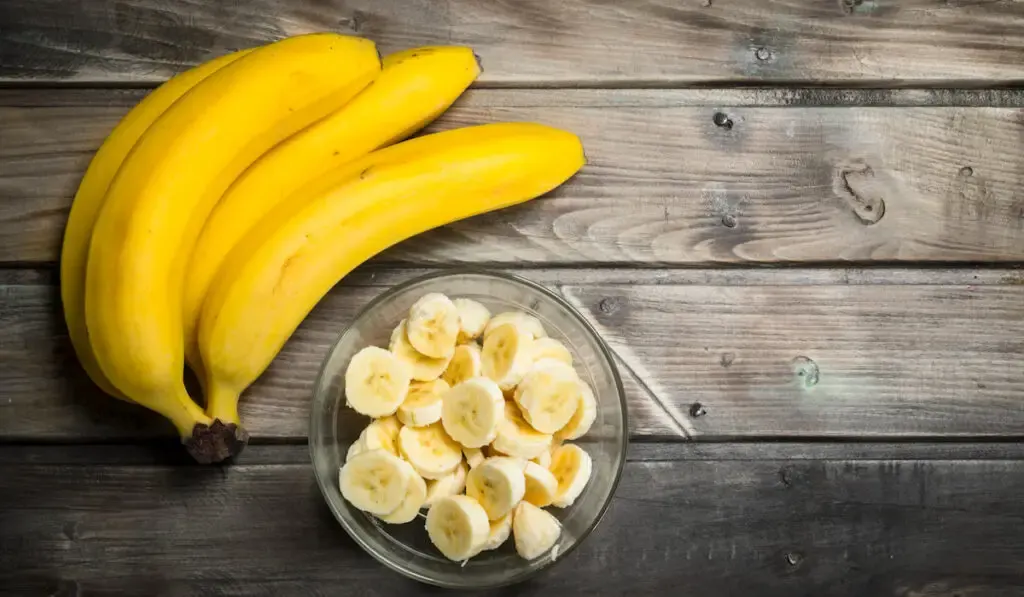
Squirrels eat bananas, and they love them. Bananas should, however, only be fed to them in strict moderation.
Bananas are sweet and highly nutritious, but overfeeding your squirrels with them could be detrimental to their health. In this case, bananas should only be fed to them once in a while and only as treats.
Banana peels on the other hand are a bad idea for squirrels because of their high fiber and cellulose content, which could bring digestive issues to your squirrels.
Health Benefits
Bananas are loaded with lots of healthy macro and micro-nutrients that are beneficial to your little critter friends. Let’s look at them in detail.
- Vitamins – bananas are high in vitamins C and E, which strengthens the squirrel’s immune system by providing a stronger base of antioxidants.
- Low-fat content – bananas are low in fat, implying that the critters are not at risk of getting obese when they consume bananas.
- Beta-carotene and vitamin A – improves the critter’s eyesight and prevents anemia.
- Fiber – helps the squirrels with digestive health only when consumed in moderation.
- Bananas are also rich in magnesium, potassium, zinc, calcium, and iron, all of which are crucial for the health and daily functioning of the squirrel’s body cells.
Precautions When Feeding Bananas to Squirrels
Overfeeding bananas is very detrimental to squirrels. Bananas have a high natural sugar content, which is good for most animals because it boosts their energy. Squirrels, however, are high-energy animals and do not need an energy boost.
The extra sugars can, however, be lethal to them because it raises their blood pressure to lethal levels, and can also cause digestive issues for the little critters.
3. Watermelon
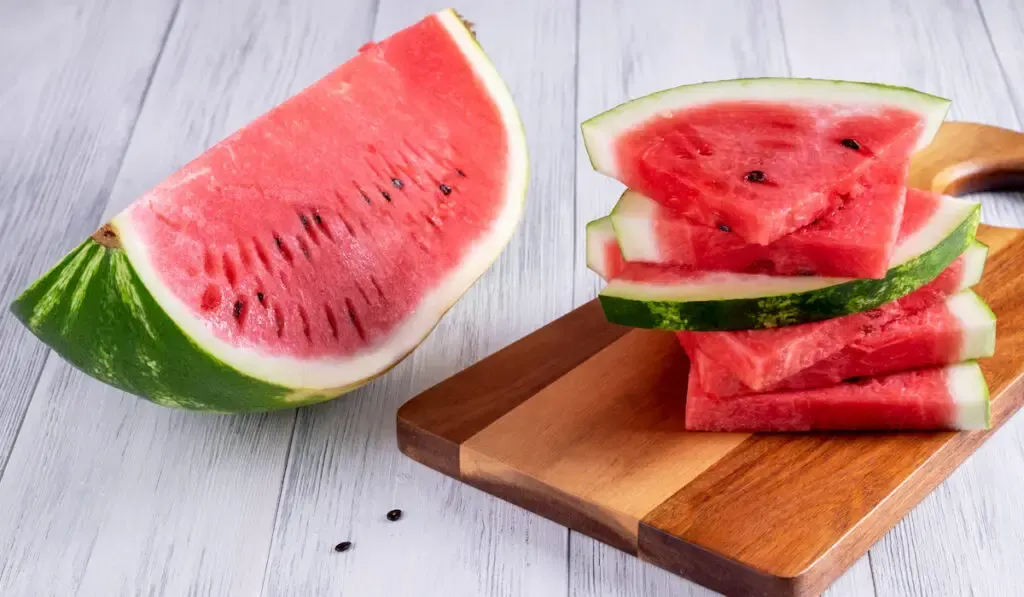
Watermelons are very safe and healthy for squirrels, and they can eat them very well. Its components, including seeds, flesh, rinds, and leaves, are all safe as long as they are not treated with pesticides since these could be toxic.
Watermelons are packed with many vitamins and minerals that are highly essential for the daily activities and health of the little critter.
Health Benefits
All parts of watermelon are safe for consumption by a squirrel. Additionally, all parts are well-packed with vital nutrients that are essential for the squirrel. Let’s look at the details.
- Hydration – 92% of the watermelon composition is pure water, which makes it a good source of water for the squirrel’s hydration.
- Brain and nervous system health – choline, a naturally occurring compound in watermelons, enhances the development of the brain and the nervous system, as well as coordinating the transmission of nerve impulses, and muscle movement.
- Heart health – lycopene, a compound found in watermelons, helps lower blood pressure and cholesterol levels, enabling your critter friend to maintain a healthy heart.
- Coat and fur maintenance – watermelons are packed with vitamin C which makes collagen, a protein that maintains the skin and keeps the fur strong.
- Improves digestion – watermelons are full of water and fiber, both necessary for healthy digestion and normal bowel movements
- Lowers inflammation and oxidation – watermelons are rich in antioxidants like lycopene and vitamin C, which are responsible for the prevention of oxidative damage and chronic diseases for your little critter friend.
Precautions When Feeding Watermelons to Squirrels
Watermelons are quite safe for consumption by squirrels, because all parts, including the seeds, are edible and not toxic.
You should, however, be careful when feeding them because they require clean and fresh watermelons. Otherwise would be a chance of introducing pathogens and toxic material for your squirrel.
4. Blueberries
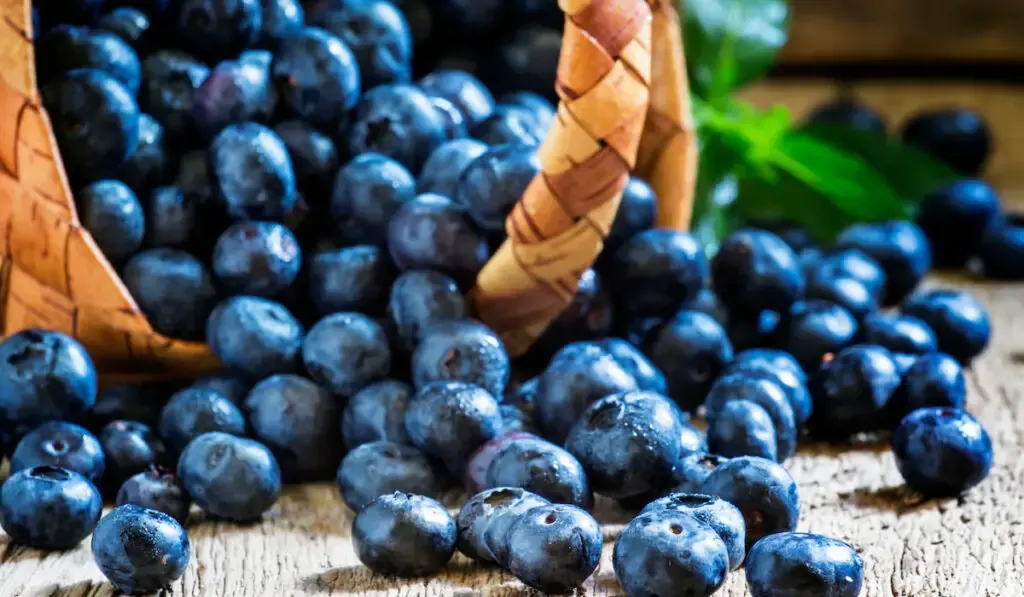
Only in moderation, blueberries are safe for consumption by squirrels. These little berries are highly packed with minerals and vitamins that that are beneficial to the squirrels.
When feeding them blueberries, you should be cautious not to overfeed, because this will result in gastrointestinal complications and hyperactivity, which is not good for the squirrels. It is therefore recommended to only feed them as treats once or twice a week.
Health Benefits
- Lowering blood pressure – blueberries are sodium-free, a factor crucial for maintaining healthy blood pressure levels. Blueberries however have potassium, magnesium, and calcium, all of which are needed in moderation for healthy blood pressure levels.
- Healthy bones – moderate feeding provides adequate calcium, magnesium, phosphorus, manganese, iron, zinc, and vitamin K, all necessary for the development and maintenance of a healthy bone structure and strength.
- Improves digestive health – blueberries have a high fiber content, which helps in maintaining a healthy digestive tract and prevents constipation.
Precautions When Feeding Blueberries to Squirrels
Blueberries are high in natural sugar, and overfeeding them to your little critter friends may get them over-excited, a situation that is not good for them.
Too much fiber resulting from overconsumption of blueberries might also upset the little critter’s stomach.
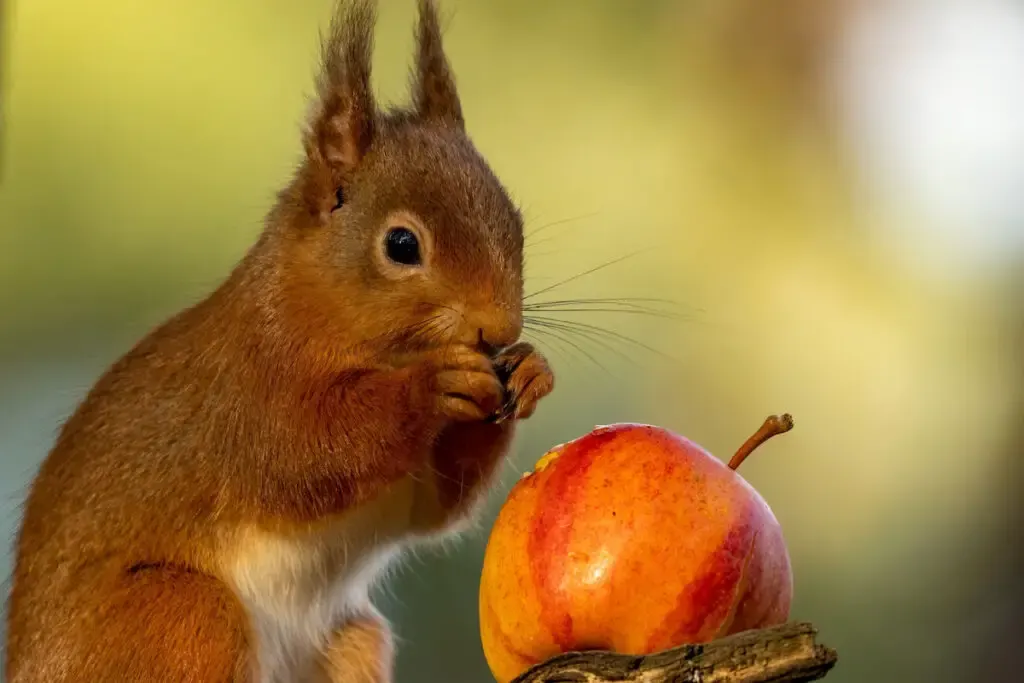
Conclusion
Though their diet is mostly made up of nuts, most fruits are also good for squirrels, but only when fed in moderation.
Squirrels are high-energy animals and do not need extra energy, especially from fruits, so fruits should only be fed to supplement their diet and provide essential nutrients. Overfeeding them can lead to detrimental effects on the squirrel.
Other fruits that are safe for squirrels are apricots, cantaloupe, cherries, honeydew, lemon, orange, papaya, peach, pineapples, pears, kiwi, pomegranate, raspberries, mangos, and grapes. You should, however, avoid dates, figs, processed fruits, and their juices, plums, raisins, and prunes.
Additionally, pits and seeds can be toxic to your little friends.
Resources
- https://www.henryspets.com/content/HealthyDietJan2014Print.pdf
- https://animalhype.com/pets/can-squirrels-eat-apples/
- https://squirrelenthusiast.com/can-squirrels-eat-bananas/
- https://animalhype.com/pets/can-squirrels-eat-bananas/
- https://squirrelenthusiast.com/can-squirrels-eat-watermelon/
- https://animalhype.com/mammals/can-squirrels-eat-blueberries/
- https://squirrelenthusiast.com/can-squirrels-eat-blueberries/

